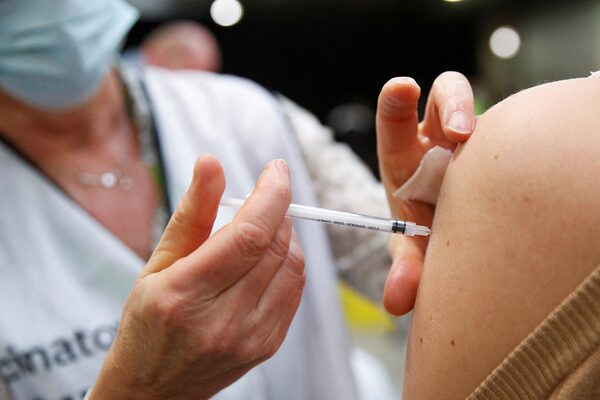Infection
Do I really need to get another COVID shot this fall?
It is a good idea to get COVID vaccine booster shots as immunity to the respiratory virus that causes COVID-19 wanes over time as the virus continues to mutate.JOHANNA GERON/Reuters
Question: I have already had multiple COVID-19 vaccines and I’ve even been infected. I must have a great deal of immunity to the virus by now. Do I really need to get another COVID shot this fall?
Answer: Unfortunately, immunity to the respiratory virus that causes COVID-19 wanes over time. And the virus itself continues to mutate. A vaccination or an infection has tended to provide about six months of protection before starting to diminish.
There is certainly good reason to avoid another bout of COVID. An intriguing U.S. study suggests that each time you get infected you run the risk of serious complications, including long COVID, in which symptoms can persist for months or more.
“A reinfection can be consequential,” said Ziyad Al-Aly, the study’s lead author and chief of research and development at the VA St. Louis Health Care System.
For their study, Dr. Al-Aly and his research colleagues used the national database of the U.S. Department of Veterans Affairs. They reviewed the cases of 443,000 individuals who caught COVID between March, 2020, and April, 2022, and compared them to 40,000 who were reinfected one or more times during the same period.
“People who got reinfected had a higher risk of long COVID complications,” said Dr. Al-Aly. The study concluded that even if you avoided long COVID with your initial illness, you are not necessarily protected with subsequent infections.
“For reasons that we don’t completely understand, a reinfection sometimes triggers a cascade of problems in the acute phase of the illness and later on.”
What to know about flu and COVID vaccines as respiratory virus season begins
Long COVID, he added, “is a chronic multisystemic illness that can affect nearly every organ,” including the heart and the brain as well as the gastrointestinal and musculoskeletal systems.
Fahad Razak, an associate professor of medicine at the University of Toronto, said the U.S. study is concerning.
“At this stage of the pandemic, the question of reinfection is incredibly important” because it’s happening to more and more people, said Dr. Razak, who is also an internal medicine physician at St. Michael’s Hospital in Toronto.
“This study highlights the stark effects on the overall risk of dying and major medical conditions like cardiovascular disease, diabetes, kidney disease and pulmonary disease – and the risk of developing these conditions clearly does go up with repeated infections.”
However, he said it is hard to determine the actual level of risk posed to the general population based on this study alone. The patients covered by the research were primarily older men, many with underlying health problems.
Another thing to consider is that the odds of developing long COVID seem to have declined.
In early 2020, when the first waves of the virus were spreading around the world, an estimated 10 to 20 per cent of the people who got infected developed long COVID, said Dawn Bowdish, a professor of medicine and a Canada Research Chair in Aging and Immunity at McMaster University in Hamilton.
At present, between 2 and 4 per cent of those who catch COVID develop symptoms that last more than 12 weeks, she said.
Dr. Bowdish attributes the decline to the majority of Canadians having received at least two doses of vaccine, which helps reduce the severity of the disease.
As well, there is some evidence that indicates the use of the antiviral drug Paxlovid may lessen the chances of getting long COVID.
Although 2 to 4 per cent may sound like a low rate, it is still quite significant, said Dr. Bowdish. “When you multiply it by the incredibly high number of infections, it amounts to a lot of people.”
Dr. Razak said “reinfections are unpredictable.”
“I’ve seen patients whose initial infections were mild and then their second infections were much more severe. So, if you can avoid repeat infections, that is a good thing.”
Most experts agree that the best way to reduce your chances of serious illness is by keeping your vaccinations up-to-date.
Indeed, the latest COVID vaccines, which target the dominant viral variants currently in circulation, may generate a more robust immune response than an actual infection.
Since the arrival of the Omicron variant, which was first identified in November, 2021, the period of protection from an infection “has been getting shorter and shorter,” said Dr. Bowdish.
“We have to draw a line between the pre-Omicron and the Omicron era,” she explained. With earlier variants, immunity against severe disease tended to last at least six months.
“Now, it’s probably somewhere between zero and three months for younger people. And, for older adults, it could be very little protection at all,” she said.
“This is one of the reasons we have been seeing waves of COVID hospitalizations every three or four months,” added Dr. Bowdish. Severe disease sometimes needs to be treated in a hospital, putting an added burden on the already strained health care system.
Researchers aren’t sure why an infection with an Omicron variant seems to stimulate a rather weak response by the immune system.
But whatever the cause, it provides another good motive to roll up your sleeve for a shot this fall.
Paul Taylor is a former Patient Navigation Adviser at Sunnybrook Health Sciences Centre and former health editor of The Globe and Mail.

